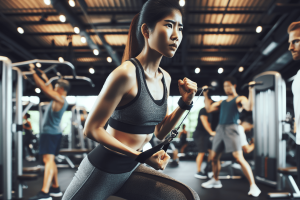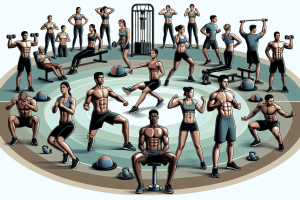So you’re on a mission to build six-pack abs and strengthen your core muscles, huh? Well, let me tell you, hydration is going to be your newfound best friend on this journey. You may have heard the phrase “abs are made in the kitchen,” but what about the importance of hydration? Well, it turns out that staying properly hydrated plays a crucial role in achieving that toned, ripped physique you’re after. From aiding in proper digestion and nutrient absorption to preventing muscle cramps and fatigue, hydration is like the secret ingredient that takes your fitness game to the next level. So grab that water bottle, my friend, because staying hydrated is about to become your new workout mantra.
Importance of Hydration in the Process of Getting Ripped
Staying properly hydrated is essential when it comes to achieving your fitness goals, especially if you’re aiming to get ripped. Hydration plays a crucial role in various aspects of your body’s functioning, including muscle growth, fat loss, performance, recovery, and appetite control. By understanding the importance of hydration in these areas, you can optimize your workouts and maximize your results.
Hydration and Muscle Growth
Hydration is closely linked to muscle growth. Our muscles are predominantly made up of water, so maintaining adequate hydration levels is key to promoting muscle synthesis and repair. When you’re properly hydrated, your muscles are able to contract efficiently, allowing you to achieve greater strength and endurance during your workouts. Additionally, sufficient hydration aids in the delivery of nutrients to your muscles, supporting their growth and recovery post-exercise.
Hydration and Fat Loss
If you’re looking to shed excess body fat and get ripped, hydration is a crucial factor to consider. Drinking enough water can help increase your metabolic rate, which in turn aids in fat burning. Additionally, staying hydrated can help suppress your appetite, making it easier to stick to a healthy eating plan and avoid overeating. By ensuring you’re adequately hydrated, you’ll enhance your body’s ability to burn fat and achieve a lean, ripped physique.
Hydration and Performance
Proper hydration is essential for optimizing your athletic performance. When you’re dehydrated, your energy levels drop, and your endurance and strength are compromised. By staying hydrated, you can fuel your workouts and maintain peak performance. Hydration also helps regulate your body temperature, preventing overheating during intense exercise. Whether you’re lifting weights, doing cardio, or engaging in any other form of exercise, maintaining optimal hydration levels will allow you to train at your best.
Hydration and Recovery
Recovery is a vital component of any workout routine, and hydration plays a significant role in the recovery process. When you exercise, you lose fluids through sweat, and this loss needs to be replenished to support effective recovery. Drinking enough water helps flush out metabolic waste products and toxins from your muscles, reducing muscle soreness and promoting faster recovery. Additionally, hydration aids in the transportation of nutrients to your muscles, aiding in their repair and growth.
Hydration and Appetite Control
Staying properly hydrated can also help you maintain control over your appetite. Sometimes, feelings of hunger can actually be indicators of dehydration. By drinking water regularly throughout the day, you can help distinguish between true hunger and thirst. Additionally, staying hydrated can help you feel more satiated and satisfied, reducing the chances of overeating or giving in to unhealthy food cravings. As part of your journey to get ripped, maintaining proper hydration will support your overall nutrition plan and make it easier to stick to your desired calorie intake.
Signs of Dehydration
Recognizing the signs of dehydration is crucial in preventing any negative impact on your fitness goals. By being aware of these symptoms, you can take immediate action to rehydrate your body and prevent any complications.
Dry Mouth and Thirst
One of the most obvious signs of dehydration is a dry mouth and an intense feeling of thirst. If you find that your mouth feels sticky or dry, or if you’re constantly thirsty, it’s likely that you need to drink more water. Remember that thirst is your body’s way of signaling the need for fluid replenishment, so be sure to listen to your body’s cues.
Dark Colored Urine
Monitoring the color of your urine is another effective means of assessing your hydration levels. If your urine is dark yellow or amber in color, this suggests that you may be dehydrated. Ideally, your urine should be a pale yellow or straw-like color, indicating that you’re adequately hydrated. Keep an eye on your urine color throughout the day to ensure you’re staying properly hydrated.
Fatigue and Weakness
When you’re dehydrated, you may experience feelings of fatigue and weakness. Lack of fluids can lead to a decrease in blood volume and low blood pressure, resulting in reduced energy levels. If you find yourself feeling unusually tired during your workouts or throughout the day, it’s important to consider whether dehydration could be a contributing factor. Drinking water and rehydrating can often alleviate these symptoms and restore your energy levels.
Dizziness and Headaches
Dehydration can also manifest in the form of dizziness and headaches. When your body is lacking sufficient fluids, it can lead to a drop in blood flow to the brain, resulting in dizziness or lightheadedness. Additionally, dehydration can cause blood vessels in the brain to constrict, leading to headaches. If you experience these symptoms, make sure to hydrate yourself and take a break from any strenuous activity until you feel better.

Recommended Daily Water Intake
To ensure you’re staying adequately hydrated, it’s important to know your recommended daily water intake. However, it’s essential to understand that individual water needs can vary based on various factors, including age, sex, activity level, and climate.
Factors Affecting Water Needs
Several factors can influence your daily water needs. If you engage in intense exercise or physical activity, you’ll need to consume more water to replace the fluids lost through sweat. Hot and humid climates also increase water requirements as you’re more likely to sweat profusely. Similarly, if you’re ill with vomiting, diarrhea, or fever, you’ll need to increase your water intake to compensate for the fluid loss.
General Guidelines for Hydration
As a general guideline, the Institute of Medicine recommends a daily water intake of about 3.7 liters (or roughly 13 cups) for men and 2.7 liters (or approximately 9 cups) for women. However, these numbers can vary depending on your unique circumstances. It’s important to listen to your body and monitor your hydration levels, adjusting your water intake accordingly. It’s also worth noting that getting water through food, such as fruits and vegetables, can contribute to your overall daily water intake.
Hydration Strategies During Workouts
Proper hydration during your workouts is essential for maintaining performance, preventing fatigue, and optimizing recovery. By following these hydration strategies, you can ensure that your body stays hydrated during exercise.
Pre-Workout Hydration
Hydrating before your workout is crucial for starting off on the right foot. Aim to consume around 500 milliliters (16 ounces) of water about two hours before your workout. This will help ensure that your body is adequately hydrated and ready to perform at its best. If you’re exercising for longer durations or in hot conditions, consider drinking an additional 250-500 milliliters (8-16 ounces) of water 15-30 minutes before your workout.
Intra-Workout Hydration
During your workout, it’s important to regularly sip on water to replace the fluids lost through sweat. Depending on the intensity and duration of your exercise, aim to drink around 200-300 milliliters (6-10 ounces) of water every 15-20 minutes. If you’re engaging in high-intensity or prolonged workouts lasting longer than an hour, consider incorporating sports drinks or electrolyte-rich beverages to replenish electrolytes lost through sweat.
Post-Workout Hydration
After your workout, it’s crucial to rehydrate your body to support recovery and replenish lost fluids. Aim to drink around 500 milliliters (16 ounces) of water within 30 minutes of completing your workout. This will help kickstart the recovery process and restore hydration levels. Remember to continue drinking water afterward to ensure you’re fully rehydrated.

Hydrating Foods and Beverages
While water remains the best hydrating option, certain foods and beverages can also contribute to your overall hydration. Including these hydrating options in your diet can support your hydration goals alongside regular water intake.
Water-Rich Fruits and Vegetables
Many fruits and vegetables have high water content, making them excellent choices for hydration. Some examples include watermelon, cucumbers, oranges, strawberries, and spinach. By incorporating these water-rich foods into your meals and snacks, you can contribute to your overall hydration and enjoy the added benefits of essential nutrients and fiber.
Coconut Water
Coconut water is a popular and refreshing beverage that is also hydrating. It contains electrolytes such as potassium and magnesium, which are beneficial for replenishing lost fluids during exercise. However, it’s important to note that coconut water also contains calories, so be mindful of your overall calorie intake if you choose to incorporate it into your hydration routine.
Sports Drinks
Sports drinks can be beneficial during intense or prolonged workouts as they provide a source of electrolytes and carbohydrates. These beverages help replenish electrolytes lost through sweat and provide a quick source of energy. However, for the average individual engaging in moderate exercise, water is usually sufficient and offers the advantage of being calorie-free.
Other Hydrating Beverages
In addition to water and the aforementioned options, there are various other hydrating beverages you can consider. Herbal teas, such as chamomile or peppermint, can be hydrating while providing additional health benefits. Additionally, unsweetened iced tea or diluted fruit juices can be hydrating alternatives if consumed in moderation. However, it’s important to avoid excessive consumption of sugary or caffeinated beverages, as they can have a diuretic effect and contribute to dehydration.
Hydration Tips for Getting Ripped
Incorporating these hydration tips into your daily routine will help you stay on track with your fitness goals and optimize your efforts to get ripped.
Drink Water First Thing in the Morning
Start your day off right by drinking a glass of water as soon as you wake up. This helps kickstart your hydration and prepares your body for the day ahead. If you find plain water to be bland, consider adding a slice of lemon or cucumber for a refreshing twist.
Carry a Water Bottle Throughout the Day
Keeping a water bottle with you at all times serves as a constant reminder to stay hydrated. Fill it up in the morning and make it a habit to sip on water throughout the day. This ensures that you have easy access to water whenever you need it and encourages regular hydration.
Monitor Urine Color
As mentioned earlier, monitoring the color of your urine can be a useful indicator of your hydration status. Aim for a pale yellow or straw-like color, indicating that you’re well-hydrated. If your urine is dark yellow or amber, it’s a sign that you need to drink more water.
Use Hydration Apps or Trackers
In the age of smartphones, there are several hydration apps and trackers available that can help you monitor your water intake. These apps offer reminders, track your daily water consumption, and provide personalized recommendations based on your individual needs. Consider utilizing one of these tools to stay accountable and ensure you’re meeting your hydration goals.
Avoid Excessive Caffeine and Alcohol Consumption
Both caffeine and alcohol have diuretic effects, meaning they increase urine production and can contribute to dehydration. While moderate consumption of caffeinated beverages or alcoholic beverages may not have a significant impact on hydration, excessive consumption can. It’s important to be mindful of your intake of these substances and balance them with adequate water consumption to maintain proper hydration.

Conclusion
Hydration is a fundamental aspect of achieving your fitness goals, especially when it comes to getting ripped. By understanding the importance of hydration in muscle growth, fat loss, performance, recovery, and appetite control, you can optimize your workouts and maximize your results. Recognizing the signs of dehydration, following recommended daily water intake guidelines, implementing hydration strategies during workouts, and incorporating hydrating foods and beverages into your diet will all contribute to your overall hydration levels. By following these tips and staying properly hydrated, you’ll be on your way to achieving the ripped physique you desire. Remember, water is your best friend throughout this process, so embrace it, drink up, and hydrate your way to success!





